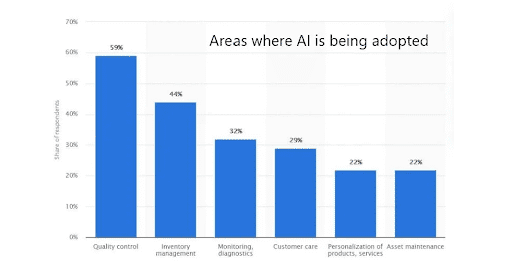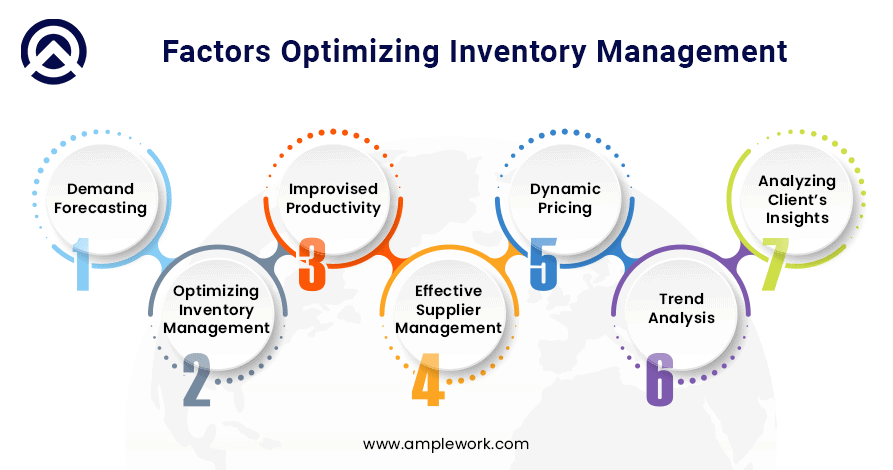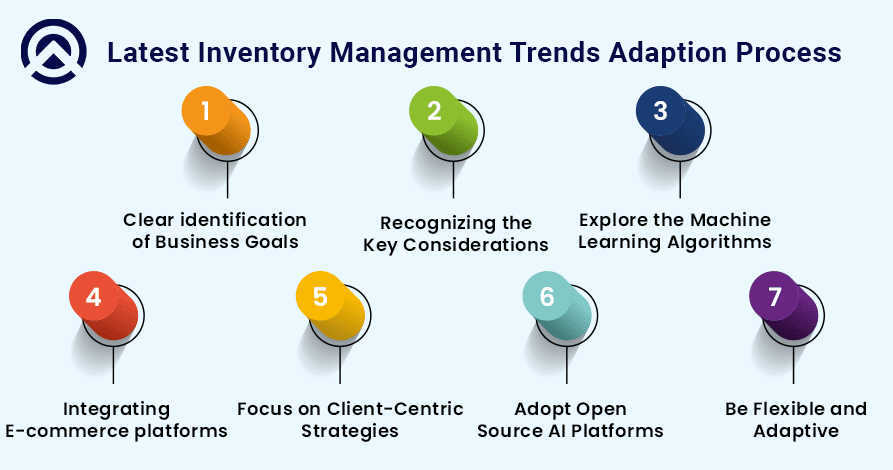AI in Inventory Management for Retail Success
With the evolution of the latest technological trends like artificial intelligence and machine learning. A wide range of sectors has been revolutionized and transformed over the years. One such evolving sector is Retail. This sector is completely transformed by the evolution of technologies, resulting in seamless shopping experiences for their clients. We all are aware that, in the current situation everyone is always busy with their work, tasks, or chores. As a reason, they didn’t get ample time for perfect shopping. In the same situation, AI in inventory management is playing a pivotal role, offering retail businesses mechanisms for the effective counting of their available stock.
Remember those days, when these businesses were processing with manual counting mechanisms that were more prone to errors and consumed a lot of time and effort of the businesses. However, such situations have now ended as AI in inventory management have been reformed and optimized processes. Reducing human efforts and saving their time, with increased accuracy. Also, these AI-based inventory management systems offer you detailed insights about the available products, ensuring the client’s satisfaction and stock safety, and generating higher revenues for the retail businesses.
In this blog, we will delve deep into generating insights about how Artificial intelligence technology solutions are completely transforming inventory management in the retail sector, leading businesses growth. Discovering the facts about how AI is turbocharging retail business operations with enhancing efficiency in terms of inventory management systems.
Here are Some Statistical Insights
According to a research outcome generated by “AI multiple” that has clearly stated the sectors where artificial intelligence is being adopted by businesses for its transformation. Quality control, inventory management, monitoring and diagnostics, customer care, personalization of products and services, and finally asset management. This survey clearly states that Artificial intelligence is adopted in the area of quality control by a maximum of 59% of businesses. The second largest sector where AI is highly adopted and utilized is Inventory Management which us used by approximately 44% of businesses. Next the thing that is at the third position in the same with an adoption rate of approximately 32% is monitoring and diagnostics. These three are the key areas for which businesses have adopted artificial intelligence and machine learning mechanisms.

The Ways How AI in Inventory Management Can Enhance Retail Businesses

Leveraging the artificial intelligence mechanism for enhanced inventory management in the retail sector can significantly improve the business’s functioning capacity, reduce the cost of operations, and enhance the client shopping experience. Here are the ways AI is transforming inventory management in the retail sector.
1. Demand Forecasting
Implementation of artificial intelligence emerging technologies are capable enough to automatically analyze the historical data comprised of previous sales, current trends, user’s experience and preferences, and several others. To identify the future demand of the users. This real-time data analysis enables businesses to perform dynamic adjustments. Ensuring that their product inventory levels are perfectly aligned with the current market trends and client preferences.
2. Optimizing Inventory Management
AI in inventory management can determine the optimal levels of the actual stock for avoiding the overstocking or understocking of any product. This functionality of artificial intelligence inventory management solutions can easily manage and maintain the inventory levels for the business so that they can fill up the inventory according to the user’s requirements and available stock. It relies on the concept of continuous product monitoring and replenishment strategies based on the demands of the users. Allowing businesses to maintain a balance between both demand and supply.
3. Improvised Productivity
Artificial intelligence algorithms are completely advanced and efficient for increasing the productivity of businesses in terms of product stock management. These algorithms are a robust set of elements that enable inventory management to automate the complete inventory management process thus increasing the efficiency and reliability of the businesses.
4. Effective Supplier Management
Based on the user’s feedback and monitoring other aspects using AI in inventory management can be a game changer for retail businesses. AI-based algorithms can evaluate the performance of the suppliers in terms of product quality, delivery speed, and many others allowing businesses to choose the reliable and best product suppliers. Artificial intelligence allows predictive analysis to anticipate the potential disruptions in the supply chain of the retail business. Which allows them to manage the inventory effectively.
5. Dynamic Pricing
The implementation of AI in E-commerce app development is capable enough to easily analyze market conditions, competitive pricing, and client’s preferences for their preferred products. Analyzing all the factors like the market conditions, competitor’s pricing analysis, and client’s behavior during the product’s checkout. Allowing the business to adjust the price dynamically considering all such situations. This inventory management approach implementing the artificial intelligence mechanism helps retailers remain ahead of the competitive edge in the market.
6. Trend Analysis
The markets are always dynamic and the trends keep changing daily. That’s the reason why businesses need to remain up-to-date when it comes to current trends. The implementation of AI during e-commerce mobile application development leads businesses to identify the current and latest trends in the market. The AI algorithms analyze social media trends, the user’s search patterns, and some other sources. Helping the retailers manage their inventory of products according to the latest emerging market trends for enhancing the shopping experiences of their clients and increasing their profitability ratio.
7. Analyzing Client’s Insights:
Identifying the buying patterns, preferences, and previous product purchases of the clients. AI mechanisms are capable of easily analyzing all such aspects depending on the behavior of the clients. Providing the businesses with accurate insights about the user’s preferred products. According to this businesses can create groups, according to which they can offer the users with personalized recommendations for encouraging them to buy their products. Also, they can provide the users with offers on their desired products to ensure the purchases.
Read more: Why Smart Searches are necessary in your E-commerce Mobile Application?
How to Adapt Latest AI-Based Inventory Management Trends

Clear identification of Business Goals
The necessary aspect for implementing AI in inventory management in the retail industry. Allows the businesses to Adopt the relevant AI trends for inventory management. Whether it’s for increasing sales, automating stock management, performing trend analysis, and many other things. These aspects allow businesses to serve their clients in a better way.
Recognizing the Key Considerations:
There are a sort of key considerations that you must identify before using AI for inventory management including the planning process, determining the financial challenges and operational inadequacies. This analysis allows the businesses to get the information that they require for implementing a targeted solution for perfectly managing the inventory of the businesses.
Explore the Machine Learning Algorithms
Leverage the machine learning algorithms for optimizing the inventory levels according to the current requirements. AI-based algorithms are capable enough to adapt to the current market trends and conditions. Also, there are a wide range of additional aspects that can ensure that your inventory of products remains aligned according to the demand of customers.
Integrating E-commerce platforms
The AI-based inventory management solutions should be integrated with E-commerce platforms during the marketplace mobile app development process. Ensuring the synchronization of online and offline shopping data offering a unified stock monitoring system to the businesses. So that they can easily keep track of its availability and other aspects.
Focus on Client-Centric Strategies
The next what you should do for implementing the AI-based inventory management system is, stay focused on the client-centric strategies. Using artificial intelligence to analyze the client’s data and preferences. So that you can tailor your inventory management strategies to the client’s requirements, offering them with a completely personalized and enhanced shopping environment.
Adopt Open Source AI Platforms
To save business costs you should consider using the open source AI platforms and frameworks. This approach offers a business economical retail inventory management solutions with a higher level of customization and flexibility in implementing artificial intelligence technology for inventory management during the E-commerce marketplace app development phase.
Be Flexible and Adaptive:
The field of artificial intelligence is evolving constantly with a wide range of advancements and changes. Being flexible and adaptive in terms of inventory management helps your businesses in driving growth. Always be prepared to adapt the necessary and required changes in the stock levels and types according to the changing user’s requirements.
The Future of AI in Inventory Management
The future of Artificial intelligence in inventory management and E-commerce app development is quite a tremendous one. That holds a wide range of key trends to shape up such a landscape with ease. Since AI enables automation of every inventory management process, leading businesses to boost their working efficiency, attracting a wide range of clients to enhance their profitability ratio. AI in the upcoming future will be incorporating a wide range of updated features and functionalities that can easily boost and optimize the process of inventory management, adapting all the latest trends in the market.
Also, we are considering a research study according to which, in the upcoming future the interaction of both humans and artificial intelligence technology will foster best-in-class information sharing and collaboration, deriving better and more effective results for both the businesses and clients. Emphasizing ethical and responsible AI practices towards providing the clients with a personalized shopping experience. The AI-tailored algorithms will be transforming the whole game in the upcoming era.
Also Read: Technologies in Supply Chain Systems to Overcome Challenges & Improve Efficiency
Wrapping It
Implementing the latest AI-based inventory management trends streamlines the business’s operations and contributes toward a completely agile and efficient supply chain network. Allowing the businesses to effectively manage and maintain the inflows and outflows of the stocks and maintaining the inventories according to the dynamically changing market trends. Thus improving the overall retail experiences of both the businesses and customers.
For implementing artificial intelligence into your marketplace mobile app development you need to hire the best e-commerce mobile app development company or outsource it to developers. One such organization is Amplework Software. Being a top mobile app development company, we closely work with our clients, to understand all their business needs. Crafting the best-in-class solutions for the businesses that best fit their requirements. So what you are waiting for is to get the best-in-class AI-integrated mobile app development solutions with us at an economical price range.
Some Case Studies of Businesses That Opted AI-Based Inventory Management
Amazon:
Amazon has implemented artificial intelligence technology for managing their inventories, predicting the user’s requirements, ensuring the optimal levels of stock, and streamlining the overall business process for them. AI has helped them a lot in transforming their growth to becoming an E-commerce giant.
Walmart:
One of the leading retail organizations that is effectively managing its vast inventory networks without any of the hassles, with the help of an AI-based automated inventory management solution that is capable enough to track historical data, trend analysis, requirement analysis, and several other aspects. Reducing the overstocking of the products and also understocking for the same.
Frequently Asked Questions
How AI is transforming inventory management operations?
AI is transforming Retail businesses by optimizing their inventory management practices. With the help of real-time data analytics, machine learning, and demand forecasting. With this, the businesses can easily control the stockings and stockouts of the inventory. According to the needs of the users and current market trends.
Can AI help you with supplier management in retail?
Yes, with the help of artificial intelligence demand forecasting involves, the factors of analysis such as such as the quality of the product and time of delivery. Through the user’s feedback and other aspects. Finalizing the suppliers, by predicting the potential disruptions in the supply chain, ensuring the complete smooth flow of inventory.
What will be the cost of Crafting AI-based inventory management solutions?
The cost of crafting AI-based inventory management systems depends on a wide range of factors such as the complexity of the project, resources involved in crafting such projects, and time taken for the completion. These are the three major factors that comprise the development costs for AI-based inventory management systems.


 sales@amplework.com
sales@amplework.com
 (+91) 9636-962-228
(+91) 9636-962-228





